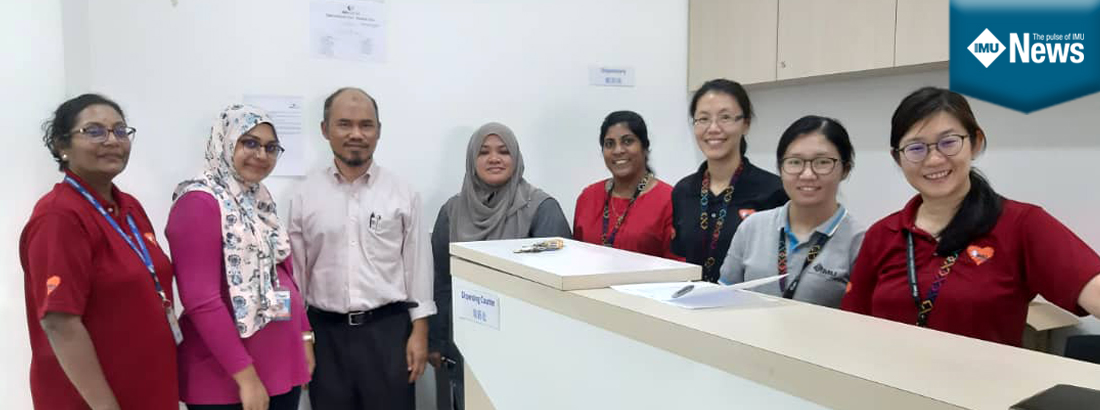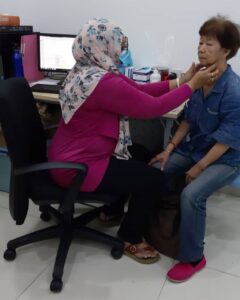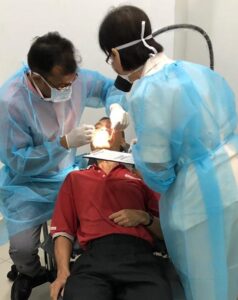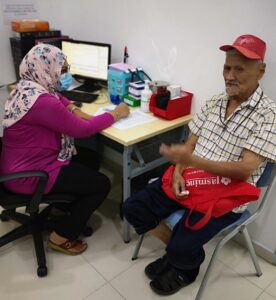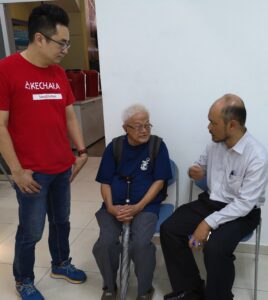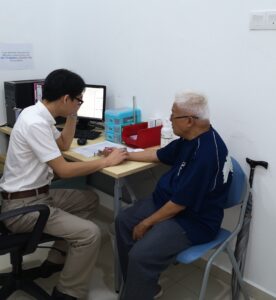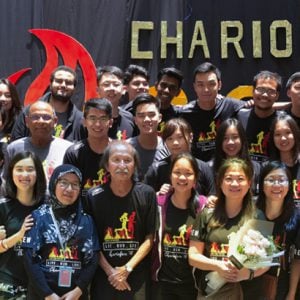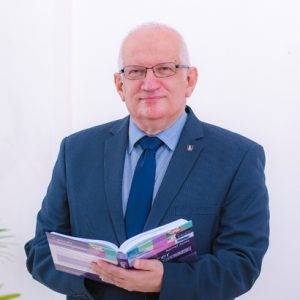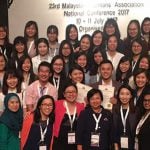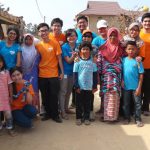IMU Foundation Medical Clinic started its services in March 2019 as a collaboration between IMU and Kechara Soup Kitchen, an NGO that feeds the homeless and urban poor. Apart from providing medical and pharmaceutical services to the people, the clinic also functions as a medium for IMU students to be work-ready as well as develop the compassion and empathy needed as healthcare professionals. This partnership is one of the finalists for the 2021 Staff Achievement Award under the Partnership Excellence for Community Service. We caught up with the person-in-charge of the clinic, Dr Sasikala Devi Amirthalingam, Senior Lecturer from the Department of Family Medicine, and July Lee from the School of Pharmacy, to get their story behind the work with the community.
Firstly, thank you both for making time for this short interview. We would like to know what were your personal experiences and motivations that drive you to be active in community work?
Dr Sasi: I originally joined Pertiwi Soup Kitchen, an organization that works with the homeless, simply because I missed seeing my patients.
At that time, I was still in the Clinical Skills Department and missed the opportunity to work with patients. I volunteer with Pertiwi Soup Kitchen on Friday evenings, and after many sessions of volunteering, these people who came for medical assistance have become people I got to know better about themselves and their lives.
Dr Sasi: Some were educated young people who had lost their jobs and they just needed someone to say ‘Hi, how are you?” Most of all, it made me realize how fortunate I am to have a family and a home to come back to.
July: When I was 16 years old, my family moved in with my maternal grandfather to help care for him as he was getting on in years. I learned the art of being caring and compassionate by watching my parents dutifully care for my grandfather. That opened a rather narrow and self-centered mind of a teenager back then. After I graduated as a pharmacist, I too chipped in as a caregiver to my grandfather until his passing. My parents are my role models for demonstrating to me the importance of stepping up, to have the courage to say, ‘I will take care of you’ even though the road could be difficult and exhausting. After I started working in IMU, there were many opportunities to be involved in community work, which I really appreciate.
| Given your experience in community work, there must be quite a lot of ups and downs. Could you tell us about some of the memorable moments/challenges in your service to the community, and why was it so memorable to you? |
|---|
| Dr Sasi: Memorable moments can be good and bad, but they are equally memorable. There are times when the street people can be quite demanding, and they want a certain medication, and when refused, they will get angry. Getting scolded in front of others is not pleasant, but you learn to stand your ground and take a deep breath before the situation can escalate. The good thing is that there will be others or your teammates from the NGO who can step in to diffuse the situation and they will do so. Good ones are hearing the greetings and seeing the smiles on their faces when they see you. It makes you feel warm on the inside. |
| July: For me, when we first started the medical services at the clinic, I was initially helping with patient registration. I asked the patients to complete their details and then realised quite a few had left their addresses empty. Without reflection, I assumed the patient might have forgotten to complete it and asked, ‘Can I please have your address?’. The patient responded, ‘I don’t have an address’. It was a watershed moment for me and the realization that the people coming to the clinic may not have a home to go back to. They have their own unique set of circumstances and I should be more thoughtful on how I interact with them. |
How does your involvement in community work in IMU shape your journey and personal development?
Dr Sasi: Back then, I was tasked to set up Klinik IMU Foundation. I learned the requirements to set up a private clinic and equip the clinic with July Lee here. It was a good experience working together and I made a good friend as well.
July: When setting up the clinic, the journey from an altruistic idea to start a charity clinic to finally obtaining a medical clinic license was long and arduous. In this journey, I worked with some of the most capable and driven colleagues, including Mazwin from IMU Healthcare and Dr Sasikala of course. I learned the importance of being kind with our words and having a sense of humour when challenges arise.
| Before we end, do you have any words of advice for IMU staff/students who are looking to be active in community work? |
|---|
| Dr Sasi: In IMU, it is almost a must to be engaged in community work as there is a lot of learning by taking part in community engagement. Whoever that involves themselves in community work should take a moment to declutter the mind of all the things we have to do and what we aim to deliver. Instead, we should look into the person’s eyes and just listen to them. When we truly see and listen to the other person, it is a moment that will touch us, and teach us. |
| July: When we are very busy with our daily work commitments, we may think there is no possible way of adding one more activity to our plate. I would say ‘Keep an open mind about it’. When I first started serving in the charity clinic, I was outside of my comfort zone. However, after a while, I realised that I do look forward to the clinic sessions. It was a good feeling to be working alongside my fellow pharmacy and medical colleagues. We slowly got to know the patients there and some will just pop into the clinic to say Hello even though they were well. The human connections we make and those we have helped along the way make the journey of community work rewarding. |
Since its establishment, the IMU Foundation Medical Clinic has been a boon for staff and students who have been with the clinic as well as the patients who visited. We hope that the clinic continues to thrive under the leadership of its committee.
The IMU Foundation Medical Clinic is a project under the IMU Foundation. It was established on 21 March 2011 as a non-profit organisation whose mission is to promote health and wellness in society and to provide opportunities for equitable access to healthcare and education for the needy, marginalised and disavantaged community. It was conceived by the management of IMU Education Sdn Bhd, which owns and manages the International Medical University (IMU), with the aim of enhancing and extending the corporate social responsibility (CSR) initiatives and activities in a sustainable and structured manner.




